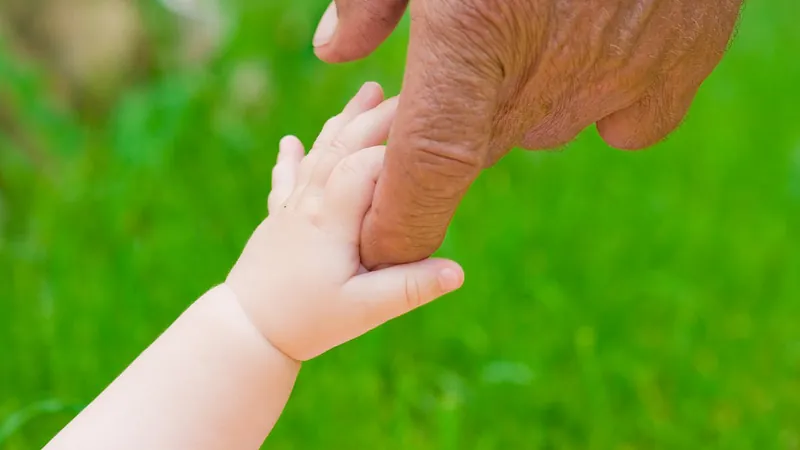
80-Year-Old Man Desires Fatherhood: Shocking Health Risks Revealed by Doctors!
2024-11-20
Author: Wei
Introduction
In a world where age is increasingly just a number, the topic of having children later in life has garnered significant attention, particularly with celebrities like Al Pacino and Robert De Niro becoming fathers at 83 and 79. Now, an 80-year-old man is contemplating joining this unique group and has reached out to experts for insights on the health implications of becoming a father at his age.
The Desire for Parenthood
The octogenarian, who describes himself as "reasonably healthy," has a partner of childbearing age and is eager to have a child together. However, he harbors concerns about potential genetic issues, including birth defects that may arise from his "old genes." To address his queries, he turned to Dr. Keith Roach, a physician known for his health-focused column in The Oregonian.
Expert Opinions on Late-Life Fatherhood
Dr. Roach shared that while he often encounters questions about late-life fatherhood from men in their 60s and 70s, questioning the viability of fathering a child at 80 is indeed unusual. He emphasized that both men and women face biological clocks, noting men experience a decline in fertility as they age, accompanied by increased risks for their offspring.
Impact of Age on Male Fertility
Research indicates that men over 40 experience a 30% reduction in the likelihood of conception. Additionally, the risk of genetic mutations escalates with age, leading to conditions such as Down syndrome, autism, and even childhood cancers, which are notably more prevalent among children of elderly fathers. Fertility specialists Dr. Leen Alhafez and Dr. Heather Fisher pointed out that factors like decreased semen volume and sperm motility contribute to this decline in male fertility, which can be traced back to hormonal changes and other physical alterations as men age.
Testosterone Levels and Aging
An intriguing study notes that testosterone levels drop significantly as men grow older, with men in their 60s seeing a 20% decrease, those in their 70s a 33% decrease, and men in their 80s experiencing levels about 50% lower than their younger counterparts. The impact on fertility becomes more evident by age 35, yet comprehensive research on outcomes for fathers in their 80s remains scarce.
Genetic Implications of Advanced Paternal Age
If the elderly man and his partner are successful in conceiving, there comes the alarming possibility of genetic conditions and defects that correlate with advanced paternal age. Doctors describe how a man's sperm continuously divides, which can lead to an accumulation of mutations over time. Consequently, advanced paternal age has been linked to numerous issues, including schizophrenia, epilepsy, and even various heart conditions.
Birth Risks Associated with Older Fathers
Adding to the concerns, the likelihood of babies born to older fathers facing challenges such as low birth weight and premature delivery has been documented, although Dr. Roach notes that the overall risk is modest. While one in 50 pregnancies to fathers under 30 may result in specific health conditions, the figure rises to one in 38 for fathers over 50.
Considerations of Longevity
Beyond the genetic and health-related risks, Dr. Roach also posed a critical point for the 80-year-old: the question of longevity. The average life expectancy for an 80-year-old man hovers just under eight years, raising the question of whether he would be present to support and nurture his child as they grow. Statistically, many fathers in such situations may not witness their child’s formative years, which could have emotional repercussions for the child.
Conclusion
Considering all these factors, Dr. Roach ultimately expressed serious concerns regarding the viability and implications of bringing a child into the world at such an advanced age, suggesting significant risks that outweigh potential joys. The reflections sparked by this man's inquiry are sure to ignite discussions on the implications of parenthood at an older age, challenging societal norms and raising critical questions about family, health, and the future.



 Brasil (PT)
Brasil (PT)
 Canada (EN)
Canada (EN)
 Chile (ES)
Chile (ES)
 España (ES)
España (ES)
 France (FR)
France (FR)
 Hong Kong (EN)
Hong Kong (EN)
 Italia (IT)
Italia (IT)
 日本 (JA)
日本 (JA)
 Magyarország (HU)
Magyarország (HU)
 Norge (NO)
Norge (NO)
 Polska (PL)
Polska (PL)
 Schweiz (DE)
Schweiz (DE)
 Singapore (EN)
Singapore (EN)
 Sverige (SV)
Sverige (SV)
 Suomi (FI)
Suomi (FI)
 Türkiye (TR)
Türkiye (TR)